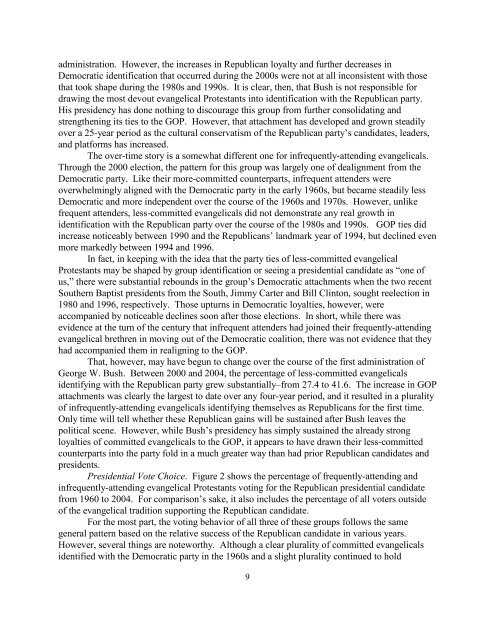George W Bush and the Evangelicals
George W. Bush and the Evangelicals: - Rooney Center - University ...
George W. Bush and the Evangelicals: - Rooney Center - University ...
- No tags were found...
You also want an ePaper? Increase the reach of your titles
YUMPU automatically turns print PDFs into web optimized ePapers that Google loves.
administration. However, <strong>the</strong> increases in Republican loyalty <strong>and</strong> fur<strong>the</strong>r decreases in<br />
Democratic identification that occurred during <strong>the</strong> 2000s were not at all inconsistent with those<br />
that took shape during <strong>the</strong> 1980s <strong>and</strong> 1990s. It is clear, <strong>the</strong>n, that <strong>Bush</strong> is not responsible for<br />
drawing <strong>the</strong> most devout evangelical Protestants into identification with <strong>the</strong> Republican party.<br />
His presidency has done nothing to discourage this group from fur<strong>the</strong>r consolidating <strong>and</strong><br />
streng<strong>the</strong>ning its ties to <strong>the</strong> GOP. However, that attachment has developed <strong>and</strong> grown steadily<br />
over a 25-year period as <strong>the</strong> cultural conservatism of <strong>the</strong> Republican party’s c<strong>and</strong>idates, leaders,<br />
<strong>and</strong> platforms has increased.<br />
The over-time story is a somewhat different one for infrequently-attending evangelicals.<br />
Through <strong>the</strong> 2000 election, <strong>the</strong> pattern for this group was largely one of dealignment from <strong>the</strong><br />
Democratic party. Like <strong>the</strong>ir more-committed counterparts, infrequent attenders were<br />
overwhelmingly aligned with <strong>the</strong> Democratic party in <strong>the</strong> early 1960s, but became steadily less<br />
Democratic <strong>and</strong> more independent over <strong>the</strong> course of <strong>the</strong> 1960s <strong>and</strong> 1970s. However, unlike<br />
frequent attenders, less-committed evangelicals did not demonstrate any real growth in<br />
identification with <strong>the</strong> Republican party over <strong>the</strong> course of <strong>the</strong> 1980s <strong>and</strong> 1990s. GOP ties did<br />
increase noticeably between 1990 <strong>and</strong> <strong>the</strong> Republicans’ l<strong>and</strong>mark year of 1994, but declined even<br />
more markedly between 1994 <strong>and</strong> 1996.<br />
In fact, in keeping with <strong>the</strong> idea that <strong>the</strong> party ties of less-committed evangelical<br />
Protestants may be shaped by group identification or seeing a presidential c<strong>and</strong>idate as “one of<br />
us,” <strong>the</strong>re were substantial rebounds in <strong>the</strong> group’s Democratic attachments when <strong>the</strong> two recent<br />
Sou<strong>the</strong>rn Baptist presidents from <strong>the</strong> South, Jimmy Carter <strong>and</strong> Bill Clinton, sought reelection in<br />
1980 <strong>and</strong> 1996, respectively. Those upturns in Democratic loyalties, however, were<br />
accompanied by noticeable declines soon after those elections. In short, while <strong>the</strong>re was<br />
evidence at <strong>the</strong> turn of <strong>the</strong> century that infrequent attenders had joined <strong>the</strong>ir frequently-attending<br />
evangelical brethren in moving out of <strong>the</strong> Democratic coalition, <strong>the</strong>re was not evidence that <strong>the</strong>y<br />
had accompanied <strong>the</strong>m in realigning to <strong>the</strong> GOP.<br />
That, however, may have begun to change over <strong>the</strong> course of <strong>the</strong> first administration of<br />
<strong>George</strong> W. <strong>Bush</strong>. Between 2000 <strong>and</strong> 2004, <strong>the</strong> percentage of less-committed evangelicals<br />
identifying with <strong>the</strong> Republican party grew substantially–from 27.4 to 41.6. The increase in GOP<br />
attachments was clearly <strong>the</strong> largest to date over any four-year period, <strong>and</strong> it resulted in a plurality<br />
of infrequently-attending evangelicals identifying <strong>the</strong>mselves as Republicans for <strong>the</strong> first time.<br />
Only time will tell whe<strong>the</strong>r <strong>the</strong>se Republican gains will be sustained after <strong>Bush</strong> leaves <strong>the</strong><br />
political scene. However, while <strong>Bush</strong>’s presidency has simply sustained <strong>the</strong> already strong<br />
loyalties of committed evangelicals to <strong>the</strong> GOP, it appears to have drawn <strong>the</strong>ir less-committed<br />
counterparts into <strong>the</strong> party fold in a much greater way than had prior Republican c<strong>and</strong>idates <strong>and</strong><br />
presidents.<br />
Presidential Vote Choice. Figure 2 shows <strong>the</strong> percentage of frequently-attending <strong>and</strong><br />
infrequently-attending evangelical Protestants voting for <strong>the</strong> Republican presidential c<strong>and</strong>idate<br />
from 1960 to 2004. For comparison’s sake, it also includes <strong>the</strong> percentage of all voters outside<br />
of <strong>the</strong> evangelical tradition supporting <strong>the</strong> Republican c<strong>and</strong>idate.<br />
For <strong>the</strong> most part, <strong>the</strong> voting behavior of all three of <strong>the</strong>se groups follows <strong>the</strong> same<br />
general pattern based on <strong>the</strong> relative success of <strong>the</strong> Republican c<strong>and</strong>idate in various years.<br />
However, several things are noteworthy. Although a clear plurality of committed evangelicals<br />
identified with <strong>the</strong> Democratic party in <strong>the</strong> 1960s <strong>and</strong> a slight plurality continued to hold<br />
9


